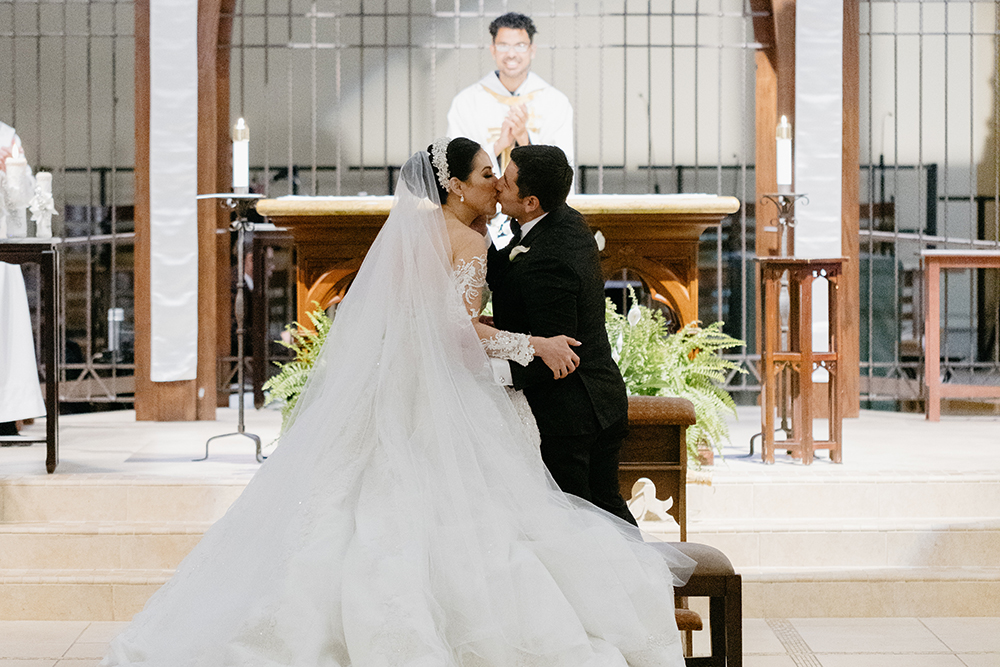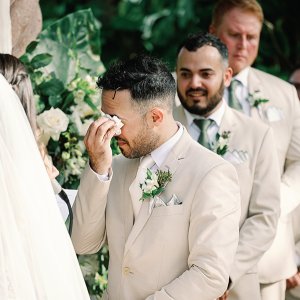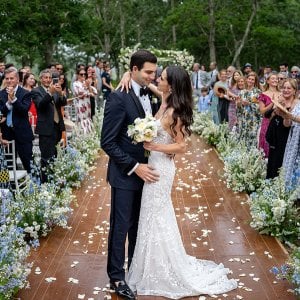We spoke with wedding experts to discuss three popular ceremony styles — legal, symbolic, and religious — and weigh the pros and cons of each. Keep reading to learn the intricacies of each ceremony style — and figure out which one may be right for you.
With all the commotion of deciding on décor, signing vendor contracts, tasting menus, and finalizing seating charts, it's easy to forget the real purpose of a wedding: to marry the person you love. This means that your ceremony should be treated as one of the most important parts of the wedding.

Photo: Julia Wade Photography
"A legal wedding ceremony is one where spouses are officially recognized by the government. An authorized officiant performs this type of ceremony, and a marriage license is filed with the appropriate government agency so that you are legally recognized as spouses. This type of ceremony is also known as a civil ceremony. It can take place at City Hall, or anywhere you desire." —George Wainwright, Coastal DJ & Video
"Symbolic ceremonies are not legally binding and are intended to celebrate and honor a couple's lifelong dedication to one another. It can incorporate modern or traditional elements that one may see in a religious ceremony or family tradition. They do not have any legal significance. A symbolic ceremony could include handfasting, a Celtic tradition where the couple's hands are bound together with cords or ribbons as a symbol of their union and commitment. Another element could be a ring-warming ceremony. This is a ceremony where the wedding rings are passed around to each guest to hold and imbue with good wishes and blessings for the couple before they exchange them during the ceremony." —Mary Angelini, Key Moment Films
"A great reason for a symbolic ceremony is if you are getting married in an international country, such as Mexico and you are from the United States. In Mexico, to be legally married, you need to have a marriage permit — in some areas, this requires blood tests as well as other medical tests and sometimes requires a certain amount of time in Mexico before your marriage. A workaround if you want an international wedding in Mexico but want to be legally married is to be married by the justice of the peace but hold your symbolic ceremony in Mexico with your guests.” —Tonya Hoopes, Hoopes Events
"Religious ceremonies are weddings with faith-filled traditions and customs. Although these ceremonies often occur in a house of worship, where the couple often attends or associates deep meaning, a religious ceremony can take place anywhere, depending on the religion. Couples with different faiths may have two separate religious ceremonies to honor both customs. Likewise, many couples seeking a spiritual ceremony combine elements of symbolic and legal ceremonies into their big day. Because the officiant is likely ordained under their religion, their power to conduct a marriage ceremony is legally respected." —Sarah Jobe, Twickenham House and Hall
"I have worked with couples who have wanted to be married by a Catholic Priest on the beach only to be devastated to find out that it wasn’t possible, and they had to get married in a church. Some couples will have a legal, religious ceremony in their church 'back home' and have a symbolic wedding in the destination of their choice so that they can have ceremonies to make all parties happy — be it themselves, their families, or whomever. We have had weddings where the bride was pregnant, and the couple got married as soon as possible at the courthouse (or similar), and the larger wedding was just a symbolic wedding as they wanted to be legally married on paper as soon as possible. It's unfortunate that not all workplaces recognize domestic partners for benefits either, and sometimes couples may quietly marry for this reason." —Loren Petrowski, Marry You In Hawaii
"The most important thing to decide is how personalized you want the ceremony. We advise a structure that allows for a high degree of personalization because that is the part that audiences really lean into. Otherwise, you're doing the same ceremony that everyone has heard — when they could be hearing about how your relationship developed, what you love about each other, and what makes you laugh. It's a completely different experience." —Brian Franklin, Vows & Speeches
No matter what type of wedding ceremony you choose, it is a unique opportunity to make a special commitment to your partner and celebrate the love that binds you together. Ultimately, it should reflect who you are as individuals and as a couple, so that when you look back on this special moment years from now, it will always evoke joyful memories.







